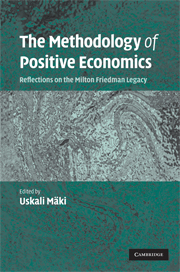Book contents
- Frontmatter
- Contents
- List of figures
- List of tables
- Contributors
- Preface
- Part 1 The classical essay in twentieth-century economic methodology
- Part 2 Reading and writing a classic
- Part 3 Models, assumptions, predictions, evidence
- Part 4 Theoretical context: firm, money, expected utility, Walras and Marshall
- 8 Friedman's 1953 essay and the marginalist controversy
- 9 Friedman (1953) and the theory of the firm
- 10 Friedman's selection argument revisited
- 11 Expected utility and Friedman's risky methodology
- 12 Milton Friedman's stance: the methodology of causal realism
- 13 On the right side for the wrong reason: Friedman on the Marshall–Walras divide
- Part 5 Concluding perspectives
- Index
10 - Friedman's selection argument revisited
Published online by Cambridge University Press: 02 December 2009
- Frontmatter
- Contents
- List of figures
- List of tables
- Contributors
- Preface
- Part 1 The classical essay in twentieth-century economic methodology
- Part 2 Reading and writing a classic
- Part 3 Models, assumptions, predictions, evidence
- Part 4 Theoretical context: firm, money, expected utility, Walras and Marshall
- 8 Friedman's 1953 essay and the marginalist controversy
- 9 Friedman (1953) and the theory of the firm
- 10 Friedman's selection argument revisited
- 11 Expected utility and Friedman's risky methodology
- 12 Milton Friedman's stance: the methodology of causal realism
- 13 On the right side for the wrong reason: Friedman on the Marshall–Walras divide
- Part 5 Concluding perspectives
- Index
Summary
Introduction
Friedman's selection argument in his 1953 essay “The methodology of positive economics” (F53) received little attention in economic methodology. There may be several reasons for this. Friedman's exposition of the argument is so short and hidden in his lengthy defense of marginalism that it might easily have escaped the attention of economic methodologists. Alternatively, methodologists may have noticed the argument, but may have considered it to be too insignificant to Friedman's overall argument, too obviously just a rhetoric trick to savior marginalism, or simply as too obviously flawed to merit any discussion. Whatever the reason for this relative neglect by methodologists, the argument has not gone unnoticed in the economics literature. On the contrary, economists of different stripes and persuasion have taken up the argument and have bent it to their own purposes. Just the fact that this happened by itself warrants taking a closer look both at Friedman's original statement of the argument and the use that other economists subsequently made of it.
What exactly is there in Friedman's selection argument that has been found worthwhile to comment and elaborate upon? One of the aims of this chapter is to point out that different answers are given to this question. Different commentators have different ideas about what it is in Friedman's argument that warrants further consideration. As we shall see, the differences are vast. Different commentators concentrate on different aspects of the argument. Different commentators come up with different interpretations of the argument and of what the argument is meant to establish. And, last but not least, different commentators draw different conclusions as to what implications the argument has for economic theorizing.
- Type
- Chapter
- Information
- The Methodology of Positive EconomicsReflections on the Milton Friedman Legacy, pp. 257 - 284Publisher: Cambridge University PressPrint publication year: 2009
- 4
- Cited by



